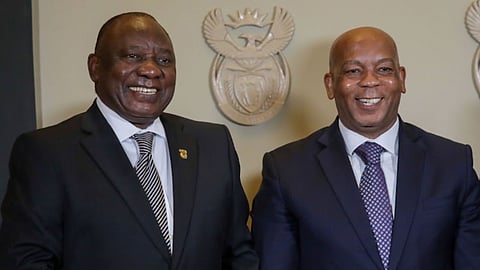National State Enterprises Bill: Is parliament breeding a monster? - Patrick McLaughllin
Key topics:
Bill centralises control of SOEs under President, bypassing Parliament and Treasury.
Treasury warns Bill breaches fiscal oversight laws and risks state capture.
Critics highlight cost, legal conflicts, and weakening of democratic accountability.
Sign up for your early morning brew of the BizNews Insider to keep you up to speed with the content that matters. The newsletter will land in your inbox at 5:30am weekdays. Register here.
Support South Africa’s bastion of independent journalism, offering balanced insights on investments, business, and the political economy, by joining BizNews Premium. Register here.
If you prefer WhatsApp for updates, sign up to the BizNews channel here.
The auditorium doors will open for BNIC#2 on 10 September 2025 in Hermanus. For more information and tickets, click here.
By Patrick McLaughllin*
The National State Enterprises Bill [B1-2024] has resurfaced in Parliament amidst widespread concern that it may be less about operational reform and more about centralising presidential control over state-owned enterprises (SOEs). Now revived in identical form post-election, the Bill proposes a powerful new entity, the State Asset Management SOC (SAMSOC), ostensibly to rationalise SOE oversight. But what lurks beneath may undermine the foundations of parliamentary democracy.
Originally drafted by the late Minister Pravin Gordhan and re-tabled by Minister Ramokgopa, who now proposes the Bill and recently accompanied President Ramaphosa on a high-level delegation to China, the Bill aims to ‘consolidate ownership functions’ under SAMSOC, positioning it as the executive holding company for 13 major SOEs. Treasury and Reserve Bank would act as financial secretariats, reporting to the Presidency.
Yet the Bill removes the Public Finance Management Act (PFMA) from applying to SAMSOC, with only cursory exceptions. Legal opinion from National Treasury (NT) underscores this as a constitutional breach, citing Section 216, which mandates fiscal oversight by NT over all government-related spending.
Treasury Alarm Bells
At a recent parliamentary committee session, NT reiterated its opposition. Acting Deputy Director-General, Advocate Empie Van Schoor, explained that the PFMA cannot be ignored when public funds are involved — and SAMSOC will undoubtedly need state guarantees. NT highlighted contradictions between the PFMA and the Companies Act and questioned the Bill’s assumption that these conflicts could simply be 'sorted out later'.
Members of all major parties expressed concern. Tony Trollip (Action SA) criticised the R615 million cost of setting up SAMSOC as 'bureaucratic bloat' and doubted government's capacity for 'innovative fundraising'. Mzwanele Manyi (MKP) went further, accusing the Bill of 'licensing state capture' and labelling it 'manipulative' and unconstitutional. Dean Bergman (DA) stressed the PFMA must trump commercial codes wherever public funds are used.
NEASA and Futuregrowth Concerns
NEASA CEO Gerhard Pappenfus raised red flags over the removal of key accountability provisions from earlier drafts. He criticised the Bill’s failure to attract private investment, warning it entrenches state dependency while masking executive centralisation. Futuregrowth Asset Management noted that the Bill adds yet another layer of legal complexity without addressing core governance failures. Their commentary questioned why a new law is needed at all when existing SOE legislation could be reformed
This Bill may appear as reform but reads more like consolidation of executive authority. It positions the President closer to operational and financial decision-making, bypassing both Parliament and Treasury. The broader political concern is that it could side-line the Government of National Unity (GNU) by building a parallel command structure for state enterprises. Minister Ramokgopa’s department, a branch increasingly seen as an ideological nerve centre for executive authority under President Ramaphosa, plays a pivotal role.
Little red book
This yearning for centralised control, some would say inspired by command-style governance, is masked under the guise of reform. The deeper concern may lie not just in the legislation, but in the motives of its drafters and the broader ideological direction in which the Presidency appears to be steering state power.
As Parliament invites final public comment, stakeholders must ask: What problem is this Bill really solving? And at what democratic cost? With public debt mounting and SOEs floundering, meaningful reform is vital. But any attempt to bypass Parliament or marginalise Treasury must be treated with the greatest caution.

